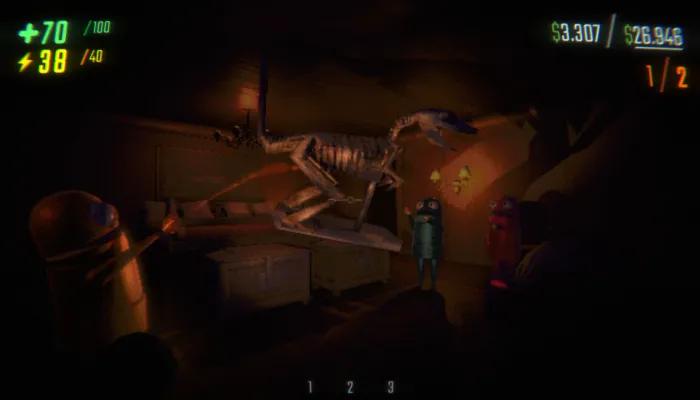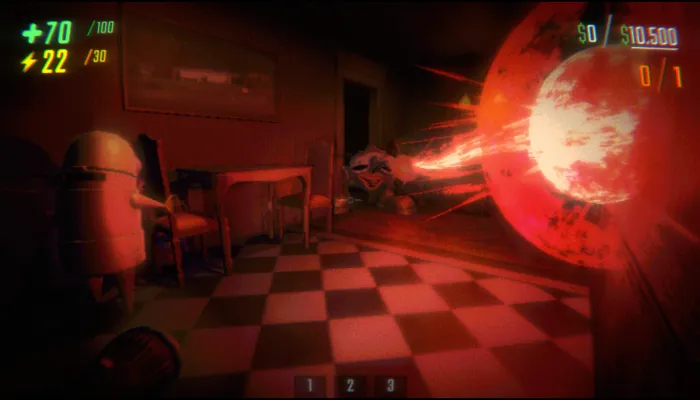
My Unexpected Encounter with R.E.P.O.
I first came across R.E.P.O. on a rainy afternoon when my curiosity drove me to test a game that promised a blend of strategy, intuition, and immersive storytelling. Wandering through a maze of online reviews and personal recommendations, I felt a spark of intrigue that only grew as I started to uncover the game's layers. The moment I booted it up, I was struck by a peculiar mix of raw energy and subtle artistry. Every detail, from the minimalist loading screens to the rich soundscapes that greeted me, hinted at something unique—a realm that not only challenged my tactical instincts but also drew me into an enchanting narrative.
Mechanical Brilliance in Every Interaction
The gameplay mechanics of R.E.P.O. are a masterclass in design finesse. As I delved into the game, I found that every control felt intuitive, almost as if the software was anticipating my thoughts. The mechanics are developed to create a seamless integration between strategy and action. I observed that each command was not just a mere input, but a step in a choreographed dance with the game environment. The responsiveness is delightfully satisfying, and I often felt that my every decision, be it a minute tactical adjustment or a sweeping maneuver, had visible, tangible consequences within the digital world. Each interaction is layered, giving the semblance that there is always something new to learn, a hidden nuance to master.
Cinematic Visuals that Transcend the Ordinary
The visuals of R.E.P.O. left me both awe-struck and contemplative. There is a boldness in its artistic choices that makes the game stand apart from its contemporaries. The realms featured are meticulously crafted, with every texture and shadow contributing to an overall cinematic experience. I found that the color palette was carefully curated to evoke specific emotions depending on the scenario—ranging from serene cool hues in moments of calm to intense warm colors during heated encounters. This contrast was not just visually appealing; it also served to reinforce the agency I felt as a player, constantly shifting the emotional tone in sync with my in-game decisions.
Immersive Narrative that Speaks to the Soul
One of the most captivating aspects of R.E.P.O. is its narrative foundation. As someone who values deep storytelling in games, I was instantly drawn into the layered story that unfolds gradually with every mission and interaction. The narrative does not rely on clichés; instead, it offers thought-provoking scenarios that often left me pondering long after I put the controller down. I particularly appreciated how the dialogue and narrative arcs provided not only entertainment but also philosophical reflections on freedom, duty, and consequence. The characters, whether they were allies or ambiguous figures on the margins of the storyline, felt tangible and resonant, almost as if I could have encountered them in real life.
Audio Design: A Symphony of Emotions
The sound design in R.E.P.O. is nothing short of brilliant. As I navigated through its intricately built world, I was constantly enveloped in an auditory landscape that perfectly complemented the visual aesthetics. The background scores are both haunting and invigorating, echoing the highs and lows of my journey. I noticed that each environmental sound—the rustling of leaves, the distant echoes of urban life, or even the subtle hum of machinery—was carefully recorded and implemented to enhance immersion. It felt as though the game was not only a visual treat but also a meticulously composed symphony that played in perfect harmony with every twist and turn of the storyline.
Intuitive Interfaces and Seamless Navigation
R.E.P.O. excels in marrying aesthetics with functionality, and nowhere is this more evident than in its user interface. I was pleasantly surprised by how little I had to struggle with menus and controls. The interface feels intelligently designed, with interactive elements that serve as extensions of the gameplay rather than obtrusive overlays. Navigating through complex settings and strategic options was a breeze once I familiarized myself with the board layout. Each icon served a clear purpose, and the overall design conveyed a sense of order amidst the rich chaos of gameplay. In moments of intense action, the UI seamlessly dissolved into the background, letting the gameplay speak for itself without unnecessary distractions.
Adaptive Challenge and Dynamic Difficulty
My progression in R.E.P.O. was marked by a well-balanced sense of challenge. The game seems to possess an adaptive learning system which adjusts the difficulty based on my proficiency. Early on, I was given a gentle introduction, minimal obstacles that allowed me to familiarize myself with the operational mechanics. As I advanced, the challenges evolved in complexity, testing my strategic planning and decision-making skills. I found the dynamic environment to be both demanding and fair, providing just enough resistance to keep every move consequential. This aspect of the design ensured that I was consistently engaged, never able to settle into monotony, and always feeling that the path ahead held new challenges designed just for my play style.
Explorative Quest Structure with Layered Complexity
One of my favorite parts of R.E.P.O. is its quest structure, which is rich in both complexity and interactivity. The game does not merely offer a linear storyline; instead, it unleashes a series of quests that interweave into the broader narrative. I was often compelled to explore hidden layers within the game’s world, discovering side missions that were intricately tied to the main storyline. These quests often provided a deeper insight into the world’s backstory, enriching my overall understanding of the context and conflicts inherent in the game’s universe. The quest design encouraged a balance between exploration and strategy, ensuring that every adventure, whether incidental or vital, enhanced the sense of a living, breathing ecosystem.
Seamless Integration of Multiplayer Dynamics
While the core of R.E.P.O. is primarily a singular, introspective journey, I was intrigued by the elements that encouraged cooperative and competitive interactions with other players. The multiplayer aspect is crafted in such a way that it does not overwhelm the solo experience but rather complements it. Engaging with other players opened up interesting strategic alliances and rivalries that added a fresh perspective to the gameplay. I appreciated how these cooperative tasks were designed to require genuine collaboration rather than simple button-mashing. This interactivity brought a level of unpredictability to the dynamics of the game, ensuring that each session with others carried its own unique set of challenges and unexpected discoveries.
Community and the Spirit of Shared Creativity
My journey with R.E.P.O. extended beyond mere gameplay; it led me into a vibrant community where players shared strategies, customizations, and stories. The game’s design appears to encourage a culture of mutual support, allowing newbies and veterans alike to exchange tips and creative insights. As I interacted on forums and social spaces, I realized that R.E.P.O. is more than just a game—it is a canvas that fosters shared creativity. The community is filled with passionate individuals who contribute mods, art, and even alternative narratives that breathe further life into the world. I felt a genuine connection in these spaces, as if we were all co-authors in an ever-expanding story of challenges and triumphs.
Innovative Technology and Forward-Thinking Design
What truly impressed me about R.E.P.O. was its commitment to innovating on multiple fronts. The developers seem to have embraced cutting-edge technology without losing sight of the timeless aspects of good game design. The integration of graphical enhancements and AI-driven behavioral patterns in non-player characters provided a realistic depth to every interaction. There is a constant push towards forward-thinking innovations that keep the gameplay fresh and unpredictable. I marveled at how certain technological advancements were harmoniously woven into gameplay, making every discovery feel like a breakthrough moment. This blend of innovation with traditional gameplay elements fostered an environment where the future of gaming felt right at my fingertips.
Expansive World-Building and Intricate Lore
The universe of R.E.P.O. is vast and permeated with intricate lore that beckons curious minds to delve deeper. I was drawn into the history and mythology that underpins the entire architecture of the game. Every location tells a story—a myth, a legend, or a conflict that resonates with echoes of bygone eras. I spent hours piecing together the fragments of lore scattered throughout the world, each discovery weaving a richer tapestry of the game’s identity. The design of the world-building strikes a delicate balance between guided narrative and player-driven exploration. I appreciated the subtle cues and environmental storytelling that allowed me to infer the historical and cultural significance of the regions I traversed. It was as though each element of the environment was gently nudging me to look closer and appreciate the artistry behind every detail.
Strategic Depth and Intellectual Engagement
Delving into the mechanics of strategy in R.E.P.O. has been an intellectually stimulating experience. I encountered puzzles and tactical dilemmas that required careful thought and foresight. The strategic landscape is dynamic, with each phase of the game challenging me to adapt my approach. I found myself constantly analyzing the balance between immediate maneuvers and long-term plans. The choices I made were not isolated events; they intertwined with a broader strategy that impacted the unfolding events. This intellectual engagement was highlighted by scenarios where I had to weigh risks and opportunities while navigating complex territories. It was both refreshing and invigorating to experience gameplay that encouraged me to stretch my cognitive boundaries, forcing me to think several moves ahead in a digital arena that rewards ingenuity.
Interactive Experimentation and Personal Invention
One of the most personally rewarding aspects of R.E.P.O. has been the freedom to experiment. I found that the game’s structure allowed me to diverge from expected paths and experiment with unconventional strategies. Every decision opened up myriad possibilities, and the reward system was closely tied to my ingenuity rather than following a rigid progression. I reveled in the opportunity to test out new tactics and to approach familiar scenarios from an entirely fresh perspective. This liberating sense of experimentation made each session feel like a personal experiment—one in which I was allowed to make mistakes, learn from them, and eventually forge a path that was uniquely mine. It feels as though the game encourages a philosophy of self-discovery, rewarding creativity and perseverance.
Adaptive Social Dynamics and Emotional Resonance
Throughout my journey in R.E.P.O., I noticed how the game intricately weaves social dynamics into its fabric. Whether interacting with a helpful companion or navigating the murky waters of competitive encounters, I was constantly reminded that the digital realm mirrors many facets of real-life relationships. There is an emotional resonance in each interaction, with the game design ensuring that every social moment carries weight. The characters I met were not mere pawns in a simulated environment; they were vibrant personalities with distinct traits, and their interactions with me often required empathy and critical thinking. I found that these exchanges often reflected broader themes of trust, loyalty, and the occasional conflict of interests—elements that truly enhanced the narrative depth.












Leave a comment
Your comment is awaiting moderation. We save your draft here
0 Comments